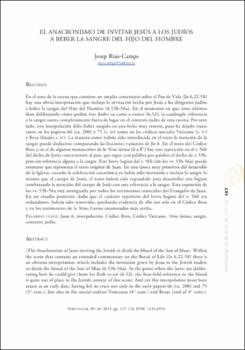El anacronismo de invitar Jesús a los judíos a beber la sangre del Hijo del Hombre
Autor
Rius-Camps, JosepFecha
2015Resumen
En el seno de la escena que contiene un amplio comentario sobre el Pan de Vida (Jn 6,22-58)
hay una obvia interpolación que incluye la invitación hecha por Jesús a los dirigentes judíos
a beber la sangre del Hijo del Hombre (6,53b-56a). En el momento en que éstos últimos
iban deliberando cómo podría éste darles su carne a comer (6,52), la cuádruple referencia
a la sangre suena completamente fuera de lugar en el contexto judío de esta escena. Por otro
lado, esta interpolación debe haber surgido en una fecha muy remota, pues ha dejado trazas
tanto en los papiros 66 (ca. 200) y 75 (s. III) como en los códices unciales Vaticano (s. IV)
y Beza (finales s. IV). La manera como habría sido introducida en el texto la mención de la
sangre puede deducirse comparando las lecciones variantes de Jn 6. En el texto del Códice
Beza y en el de algunos manuscritos de la Vetus latina (d a ff2
) hay una repetición en el v. 56b
del dicho de Jesús concerniente al pan, que sigue casi palabra por palabra el dicho de v. 53b,
pero sin referencia alguna a la sangre. Este breve logion del v. 56b (sin los vv. 53b-56a) puede
estimarse que representa el texto original de Juan. En una época muy primitiva del desarrollo
de la Iglesia, cuando la celebración eucarística ya había sido instituida e incluía la sangre lo
mismo que el cuerpo de Jesús, el texto habría sido expandido para desarrollar este logion
combinando la mención del cuerpo de Jesús con una referencia a la sangre. Esta expansión de
los vv. 53b-56a está atestiguada por todos los testimonios conocidos del Evangelio de Juan.
En un estadio posterior, dado que el carácter repetitivo del breve logion del v. 56b era
redundante, habría sido removido, quedando evidencia de ello tan solo en el Códice Beza
y en los testimonios de la Vetus Latina enumerados más arriba. With in he scene that contains an extended commentary on the Bread of Life (Jn 6.22-58) there is an obvious interpolation, which includes the invitation given by Jesus to the Jewish leaders to drink the blood of the Son of Man (6.53b-56a). At the point when the latter are deliberating how he could give them his flesh to eat (6.52), the four-fold reference to the blood is quite out of place in the Jewish context of this scene. And yet this interpolation must have arisen at an early date, having left its trace not only in the early papyri 66 (ca. 200) and 75 (3rd cent.), but also in the uncial codices Vaticanus (4th cent.) and Bezae (end of 4th cent.). How the mention of the blood was introduced into the text can be deduced by comparing the variant readings of John 6. In the text in Codex Bezae and some Old Latin manuscripts (d a ff2 ), there is a repetition in v. 56b of Jesus’ saying concerning the bread, which follows almost word for word the saying of v. 53b but without any reference to the blood. This short logion of v. 56b (without vv. 53b-56a) can be supposed to represent the original text of John. At an early point in the development of the Church, when the Eucharistic celebration had been instituted and included the blood as well as the body of Jesus, the text would have been expanded to develop the saying by combining the mention of the body of Jesus with a reference to the blood. This expansion of vv. 53b-56a is attested by all known witnesses of John’s Gospel. At a later stage, because the repetitious short saying of v. 56b was redundant it would have been removed, leaving evidence of it only in Codex Bezae and the Vetus Latina witnesses listed above.





